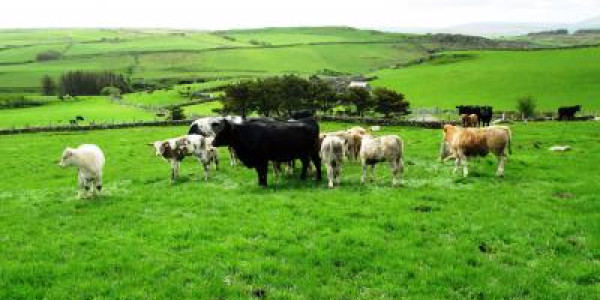Taylor Scott International News
FIGURES proclaiming a boom in Scottish farmland values have been slammed as the work of industry professionals ‘talking up’ a market that rewards them on a percentage commission basis. There are some who say land values should be based on what the land can produce Outspoken land reformist Andy Wightman this week took a swipe at the Royal Institute of Chartered Surveyors after the positive results of its Rural Land Market Survey were widely reprinted in the national press and media. Mr Wightman branded reports that repeated the headline ‘farmland hits a record high’ as misleading, and challenged the factual basis of RICS’ claim that farmland prices had more than trebled in less than a decade. The land campaigner highlighted that these figures actually stemmed from the surveyed ‘opinion’ of members of RICS – not their actual sale statistics. Mr Wightman said on his blog: “Looking at the Rural Market Survey report itself (which is only available if you register as a RICS site user), things become clearer. “The claim that ‘prices had trebled in less than a decade’ is based upon an ‘opinions based’ measure, which is a hypothetical estimate by surveyors of the value of pure bare land. “As the small print makes clear: ‘Net balance data is opinion based; it does not quantify actual changes in an underlying variable’,” he noted.”It is also a UK wide figure and thus says nothing about the farmland market in Scotland.” RICS spokeswoman Sue Steer declared at the time of release of the figures that: “The growth in farmland prices in recent times has been nothing short of staggering. In less than 10 years we’ve seen the cost of an acre of farmland grow to such an extent that investors – not just farmers – are entering the market. “If the relatively tight supply and high demand continues, we could experience the cost per acre going through the £10,000 barrier in the next two to three years,” she ventured. In his withering put-down, Mr Wightman countered: “What she really means is that’s the cost of an acre of land according to the opinion of her members. And when she speculates that the cost per acre could go through the £10,000 barrier in the next two or three years – that too is simply the opinion of those with a vested interest in precisely that outcome,” said Mr Wightman. That ‘vested interest’ is something the Scottish Tenant Farmers Association is also concerned with, particularly as it fears these buoyant prices will heighten landlords’ expectations in the next round of rent reviews in November. Chairman Christopher Nicholson said: “The capital cost of land rarely reflects its agricultural productivity and this is as true in the rental market as scarcity causes rents to overtake profitability. It is high time that common sense was brought to bear and sitting tenant rents become based on the real worth of the land, that is, what the farm can produce rather than what it could fetch in an over-heated market stoked by profit driven land agents.” STFA would, he said, be using the forthcoming review of agricultural holdings to press for radical change to the way in which farm rents are set to ensure tenants’ businesses are not ‘crippled by unreasonable rent demands’. Responding to this furore, RICS Scotland director Sarah Spiers said: “Over the last decade, the bi-annual RICS Rural Land Market Survey, undertaken by our members in Scotland, has proven to be a leading indicator for the rural sector. “It provides local-level knowledge and insight from chartered surveyors working in the rural and land sectors in Scotland, rather than official views of company research departments. “It is not in the interest or benefit of RICS members in Scotland to ‘talk up the market’; it is their responsibility to report the market accurately, not steer it,” she insisted. Commenting on the RICS survey – and the STFA’s warning – landowners’ body Scottish Land and Estates insisted that recent increases in land values were not the reason for rises in agricultural rents. SLaE director, Andrew Howard, said: “The fundamental point is that farm rents are good value and this has been reflected by official statistics published by the Scottish Government this year. “The main driver for any increases in rent is productivity of the farm, not the capital value of the land. More often than not when agriculture is not doing so well then rents remain fairly static. There have been rises in recent years because farming has been having a good period of productivity. “The other important factor in rent reviews is that it is only in recent years that reviews have been conducted on farms where the rent had been unchanged for a very long time,” he added. “Land capital values generally do not influence rent calculations and if there are rent increases later this year this will not be the reason,” he maintained. Taylor Scott International
Taylor Scott International, Taylor Scott








